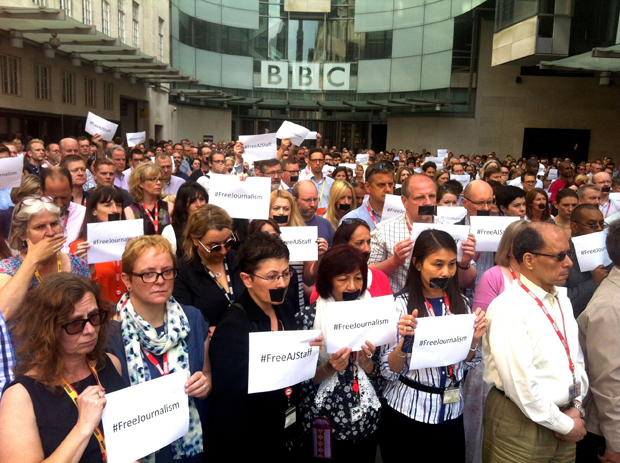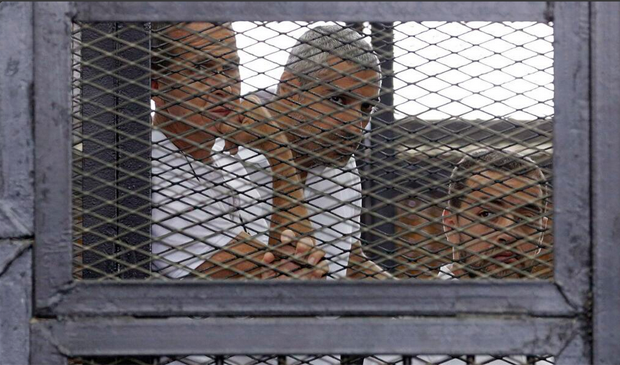24 Jun 2014 | Egypt, News, United Kingdom

(Photo: Casey Prottas for Index on Censorship)
The usually bustling entrance of the New Broadcasting House in London was still filled to the brim with people this morning, but for one minute they were completely silent.
BBC staff, joined by fellow journalists from around the world, stood in silent protest at 9:41 am, exactly 24 hours from the sentencing of three Al Jazeera journalists to prison in Egypt. Peter Greste and Mohamed Fahmy were each handed down seven-year sentences, while Baher Mohamed was given ten years.
The three journalists were found guilty on Monday for spreading false news by a court in Cairo. Ten other journalists, including Al Jazeera’s Sue Turton and Dominic Kane, and Rena Netjes, a correspondent for Dutch newspaper Parool, were also sentenced in absentia to ten years.
The silent protest was orchestrated in hopes of fighting against these unjust practices and to raise awareness of the dangers and censorship many international journalists face.
BBC Director of News, James Harding, stood up and addressed the group: “They are not just robbing three innocent men of their freedom, but intimidating journalists and inhibiting free speech.”
The protestors held signs that read #FreeJournalism and #FreeAJStaff, and covered their mouths with tape in order to illustrate their frustration with the trial verdict.
Sana Safi, a presenter for BBC Pashto TV News, said: “When I heard the verdict, I was in shock because I’m from Afghanistan and we have seen more media freedom in the last few years, and I wasn’t expecting anything like that from a country like Egypt.”
Their looks were determined and their heads were held high as cameras flashed and captured the intense moment. Cowardice was not an option.
Nasidi Yahaya, a social media producer from BBC Hausa, said: “The verdict was so unfair, these guys were just doing their job. Journalists should not be silenced like this.”
The journalists from the BBC, Al Jazeera, and other news organisations standing together in solidarity will also be sending a letter calling on the Egyptian president to intervene in the situation.
The wait for their freedom begins.
This article was posted on 24 June, 2014 at indexoncensorship.org
23 Jun 2014 | Egypt, News

The sentencing of Al Jazeera journalists today took Michelle Betz back to her own trial.
Just over a year ago I was awoken around 5am in Washington by a call from my Egyptian colleague. “Guilty,” he breathed. “We are all guilty”. I could hear the shock in his voice. I couldn’t yet feel my own shock.
We were defendants in the NGO trial in which 43 people working for four US and one German NGOs were accused of charges including operating without a licence and bringing foreign funds into the country. There were so many ironies about the case, the trial, and the charges; so many outrages; so many injustices. There were many, many parallels with what is happening now with the Al Jazeera journalists.
There was little international noise around our “trial”. And that is the one thing that has been different with the Al Jazeera trial – at least there has been no silence.
At the time I was working with the International Center for Journalists, from Washington DC. Judicial officials didn’t even have my full name, but there I was number 39 on the charge document.
I knew full well one year ago that we would be found guilty despite the multitude of assurances from all corners: the NGOs, the US State Department, the lawyers – all tried to assure us that this was all political (between the US and Egypt) and that this would “all go away”. Of course, logically, this should have all gone away. Just as with the Al Jazeera case, logically, it never should have happened. Logically, we, as they, should have been found innocent.
But dealing with the Egyptian judicial system is anything but logical.
In neither case was there any evidence and in neither trial did the prosecution have any legitimate case. But that was beside the point. They didn’t need evidence. They didn’t need a case. All they needed to do was follow the directive from on high and read the verdict: guilty.
I lived in Egypt for three years and I can never go back. If I did I would be immediately imprisoned.
Some have expressed surprise at the speed with which today’s verdict was rendered asking how the judge could possibly have written his judgment in so short a time. He didn’t. Instead, it’s highly likely that the judgment was already written six months ago. The judge was simply doing what he was told. I too would have worn sunglasses to court today; I too would have dragged my feet getting to work for surely there was some weight on his conscience.
So what now? The Egyptians learned from our case. At least in the NGO case none of us were imprisoned, though Egypt did pursue some of us through Interpol. The one thing the US did was to get all Americans (save one hero, Robert Becker, who refused to leave his Egyptian colleagues facing trial alone) first to the US Embassy in Cairo (where they stayed for days) and then finally flew them out in the middle of the night after some backroom deal was worked out with Egyptian officials.
And the Egyptian establishment has learned from this. They learned not to allow bail to prevent defendants leaving Egypt. They learned that the US (and the international community at large) didn’t care and that there would be no repercussions even if American citizens were convicted and sentenced to five years of hard labor. They learned that even the media didn’t care.
But on that last point they miscalculated – they didn’t realise that there is a tribe of journalism, which does not suffer injustice and attacks on its own. And that is our hope at this point – that we raise our voices, we continue to speak the truth, we continue to point to injustices, including injustices wrought on our tribe. For if we are silenced, then we all face injustice.
Yes, of course there was no evidence and of course the prosecution had no case. And so today we find ourselves one year on watching in horror as three Al Jazeera journalists are convicted and sentenced to 7-10 year prison sentences and those convicted in absentia to an even lengthier sentence (just like those convicted in absentia in the NGO trial, such as myself, who received longer sentences).
And so while my colleagues were shocked by our verdict one year ago, I was not. And if we were found guilty then so too would our Al Jazeera colleagues. There was a message to be sent.
But the convictions should be no surprise. Rule of law in Egypt as always been tough to find but almost any remaining semblance of it disappeared with the coup of 2013.
This article was posted on June 23, 2014 at indexoncensorship.org
23 Jun 2014 | Belarus, News

Ales Bialiatski was released from detention. (Photo: Andrei Aliaksandrau for Index on Censorship)
Ales Bialiatski, a Belarusian human rights defender, was released from prison on Saturday after almost three years behind bars on politically motivated charges.
“My release came as a surprise. I was not expecting anything like that. There was a usual routine check in the morning and they took me to work with other prisoners. But around 9 a.m. I was summoned to the prison director’s office, where they told me I am being released due to an amnesty,” Bialiatski said during the press conference in Minsk today.
Bialiatski, the chair of the Human Rights Centre Viasna and a vice president of the International Federation for Human Rights (FIDH), was arrested on 11 August 2011 in Minsk and later sentenced to 4.5 years in prison for alleged tax evasion. He did not admit guilt and stated the funds in his bank accounts abroad were in fact spent for activities of Viasna and supporting victims of human rights abuses in Belarus.
“I am not sorry for those three years I spent in prison. This is the price you pay for making Belarus a free and democratic country. If we want to improve our life and drag Belarus out of the swamp it has been in for 20 years already, we need to be active and not to be afraid of repressions civil society faces. I knew what I was in prison for, that is why it was easy for me emotionally,” Bialiatski said.
In fact, it was not always easy. “Political prisoners in Belarusian jails are kept in different conditions than other prisoners. For instance, no one was allowed to talk to me, even if it was a friendly chat about weather or football, a person who approached me could be punished by the prison authorities. That was just one of many examples of physiological pressure political prisoners face in jail,” he said, describing his time behind bars.
He symbolically crossed his name out of the list of Belarusian political prisoners on a campaigning T-shirt his colleagues wore while he was in jail.
“So, Bialiatski is out, but seven more are still there. Belarus has to become a country without political prisoners. I demand from the authorities to release all political prisoners and stop prosecuting people for their political views,” Bialiatski said.
Bialiatski expressed his gratitude to “tens of thousands of people” from Belarus and around the world who supported him during his time in prison and campaigned for his release. Bialiatski also said he is not going to leave the country and he is determined to continue his human rights work.
There will certainly be ground for that as Belarus continues to have a poor human rights record. Most commentators inside the country do not see Bialiatski’s release as a sign of any genuine improvement of the human rights situation, but merely a step of “good will” that can ensure possible renewal of a dialogue with the European Union.
“The EU is clearly looking for ways and platforms for a dialogue with Belarus. Europe certainly wants to decrease tensions in the region and stabilize the situation that was created because of Ukraine and its conflict with Russia. And it can be strategically important for the EU not to allow Belarus turn completely pro-Russian. The problem is the authorities of the country refuse to talk to the Belarusian civil society, and what we have started seeing is the West is ready to give in to the government of Belarus and ‘sacrifice’ participation of active NGOs in a possible dialogue. This will be a huge mistake. Lukashenko is going to deceive Europe once again, and we can see another clampdown on civil society of the country after the presidential elections of 2015,” Uladzimir Matskevich, a Belarusian methodologist and analyst, says.
“I am really happy Ales is out of prison – but I can hardly say he is ‘free’. We are all not free here. Bialiatski’s release is certainly great, but it does not signal any change. The authorities keep tight control over society. Dictators act this way; they need to show they are capable of strict punishment and mercy; they need to show acts of both time to time to manifest they are in charge. This is perhaps what we see with Ales’ release. The opposition is still too weak and disengaged to break through this vicious circle,” Matskevich said.
This article was published on June 23, 2014 at indexoncensorship.org
23 Jun 2014 | Egypt, News

Index on Censorship condemns the sentencing of three Al Jazeera journalists in Egypt to seven years each in prison. Peter Greste, Mohammed Fahmy and Baher Mohamed were sentenced today to seven years imprisonment under accusations of spreading false news and supporting the Muslim Brotherhood. The journalists were detained on 29 December 2013.
“Today’s verdict is disgraceful,” Index CEO Jodie Ginsberg said. “It tells journalists that simply doing their job is considered a criminal activity in Egypt. We call on the international community to join us in condemning this verdict and ask governments to apply political and financial pressure on a country that is rapidly unwinding recently won freedoms, including freedom of the press. The government of newly elected president Abdel-Fattah el-Sissi must build on the country’s democratic aspirations and halt curbs on the media and the silencing of voices of dissent.”
The court’s decision comes as a severe setback for all journalists currently jailed or prosecuted for doing their job, and reinforces claims of a politicised judiciary in Egypt. Other defendants in the case, who were tried in absentia, got sentenced to 10 years.
Index is deeply concerned at the growing number of imprisoned journalists in Egypt and around the world. At least 14 journalists remain in detention in Egypt and some 200 journalists are in jail across the globe. Many of those arrested in Egypt were reporting on protests following the ousting of Mohamed Morsi or the passing of a controversial anti-protest law.
We reiterate our support to journalists to report freely and safely and call on Egyptian authorities to drop charges against journalists and ensure they are set free from jail. And we ask governments to maintain pressure on Egypt to ensure freedom of expression and other fundamental human rights are protected. Index joined the global #FreeAJStaff campaign along with other human rights, press freedom groups and journalists.



